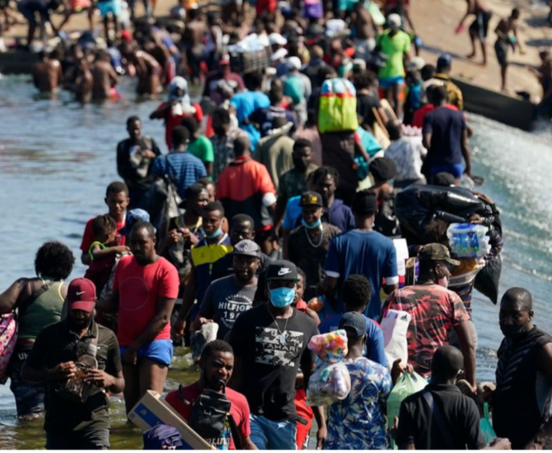Climate, Health and Equity Brief
Migrants, kids and a future in peril
October 6, 2021

The Climate, Health & Equity Brief is GMMB’s take on the week’s news on the current impacts of climate change. If you haven’t subscribed yet, you can do so by clicking here.
Hot Topic: Global crises. From the U.S. to South America and beyond, climate change is fueling a growing number of public health and economic crises and threatening the livelihoods of hundreds of millions of people.
Here in the U.S., federal officials revealed that water levels are falling so quickly in Lake Powell that its hydroelectric power generation could become impossible as soon as next year. As the second-largest man-made reservoir in the nation, the lake distributes power to nearly six million homes and businesses spanning from Nebraska to Nevada when running at full capacity. It is also a critical source of drinking water and irrigation for millions living in cities, towns, rural farms and native communities in Arizona, California and Nevada. Amid the climate-fueled megadrought in the West—which has now persisted for 20 years—these projections illustrate how vulnerable our country’s vital infrastructure systems are to an increasingly warming climate.
And severe drought is not just a domestic issue. In Guatemala, punishing drought and prolonged heatwaves are just two of several extreme weather events that are devastating communities dependent on agricultural production to sustain their livelihoods. In fact, the UN has indicated that more than one-fifth of the country’s entire population is now food insecure due to climate-fueled extreme weather. As more and more families grow desperate, there are now tens of thousands of Guatemalans choosing to attempt the treacherous journey north to find respite in the U.S.
The same is true in Haiti, where political turmoil following the assassination of the country’s president and the effects of Tropical Storm Grace have left people facing such instability that many are now choosing to migrate. In just the past month, up to 40,000 migrants have attempted to cross the Texas border in hopes of a brighter future. And these migration patterns are not isolated. According to the UN, extreme weather events have pushed an average of 21.5 million people to migrate since 2010—with the vast majority coming from countries already struggling with political and social conflicts. As warming temperatures fuel even more frequent and intense disasters, these staggering numbers will only grow.
Tragically but not surprisingly, a new study released this week revealed that globally, children born during or after 2020 will face seven times more extreme heatwaves and twice as many droughts and wildfires as those born in 1960. Thankfully, a poll released this week found that 70 percent of Americans are now “very worried” or “somewhat worried” about the climate crisis—a ten percent increase in just the past six months—and that for the first time in history, a majority believe the climate crisis is impacting their lives “right now.”
While this data is heartening, empirical data and day-to-day realities continue to show that we are not moving quickly enough to avoid some of the worst impacts of the climate crisis—making the stakes for deliberations in Washington and abroad in the coming days and weeks more important than ever.
— Matt & Traci, GMMB
Human Health
A new analysis found that without rapid global action to limit planetary heating below 2°C (3.6°F), children born in or after 2020 will face seven times moreextreme heatwaves and twice as many droughts and wildfires on average than those born in 1960. (The Guardian)
A new analysis warns that climate-fueled increases in average temperature, precipitation and humidity worldwide are broadening ideal conditions for malaria transmission and threatening to prevent disease elimination even in countries declared malaria-free by the WHO. (Financial Times)
New projections from the Bureau of Reclamation warn that as soon as next year, severe drought conditions could halt hydropower generation in Lake Powell—the second-largest US reservoir—leaving 5.8 million homes and businesses across seven states without a crucial source of power. (CNN)
A new poll found that 70 percent of Americans are “very worried” or “somewhat worried” about the climate crisis—a ten percent increase within just the past six months—and that for the first time ever, a majority of Americans believe that climate change is impacting lives “right now.” (Axios)
Planetary Health
New research revealed that average summer temperatures along the northeast US coast have increased by 2°C (3.6°F) over the past 100 years—making it the fastest-warming region in North America. (The Hill)
Wildfires in California are destroying hundreds of ancient sequoia trees in Giant Sequoia National Monument, once thought to be impervious to wildfires—many of which date back more than 1,500 years. (San Francisco Chronicle)
The great climate migration has begun.”
-The New York Times Magazine
Equity
Thousands of Haitians are seeking asylum at the US southern border amid recent extreme weather events, social unrest and poverty in their home country—a warning sign of how climate change is intensifying migration from vulnerable countries. (E&E News, CNN)
Years of severe drought followed by devastating hurricanes, powerful floods and dangerous mudslides have decimated agricultural production in Guatemala, fueling a migration crisis as farmers and families leave their homeland to find new beginnings and food security. (NBC News)
Politics & Economy
A group of 21 states, the District of Columbia and several major U.S. cities urged the EPA to increase vehicle emission reduction rules, claiming that its proposed goal of boosting efficiency by 10 percent in model year 2023 is insufficient. (Reuters)
Federal flood insurance costs are expected to increase as subsidies are slowly reduced in coming years, setting up a contentious battle between advocacy groups and lawmakers as some are worried about the potential for costs to increase tenfold. (The New York Times)
Action
California Governor Gavin Newsom signed a $15 billion climate change package last week—the largest state package in U.S. history—with billions designated for drought response, water resilience, EV infrastructure, wildfire prevention and extreme heat and sea level rise mitigation, among other initiatives. (Los Angeles Times)
American automaker Ford announced plans for an $11.4 billion electric vehicle assembly plant and battery factories in the U.S., marking the single largest manufacturing investment in the company’s 118-year history. (Axios)
Kicker
In the face of increasing species extinctions and as climate change continues its threat to global biodiversity, check out this interactive map that projects where animals will be forced to move to survive.
The GMMB Climate, Health & Equity Brief would not be possible without the contributions of the larger GMMB California team—Aaron Benavides, Elke Cortes, Stefana Simonetto and Sydney Lykins. Feedback on the Brief is welcome and encouraged and should be sent to CHandEBrief@gmmb.com.






